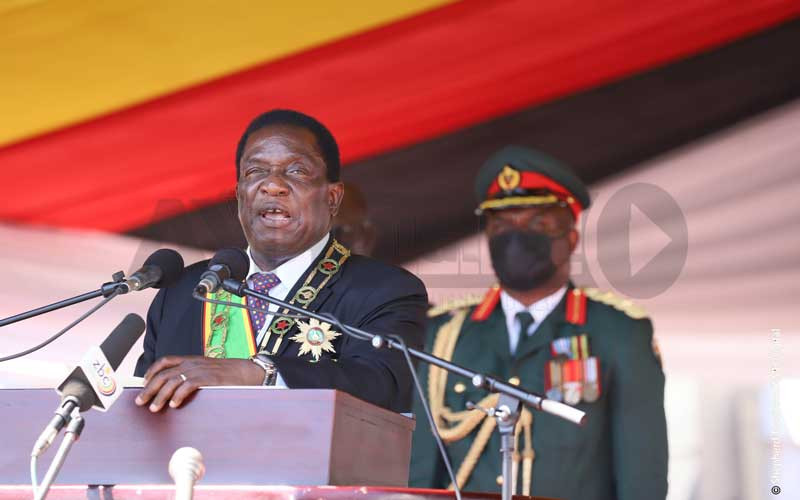
AFTER 12 months, we once again take stock of a disappointing year where Zimbabwe’s political leaders continue to disappoint.
With almost 265 days gone in the year, not many people would be celebrating the year due to the shortcomings from government and political leaders.
It has been a year where Nelson Chamisa finally dumped the MDC attachment to form the Citizens’ Coalition for Change (CCC).
He has, however, left many observers wondering his next move as he continues to shy away from creating structures as well as running the party without a constitution.
But if the move was to cause anxious moments in the March by-elections, Chamisa’s plan seems to be working.
Douglas Mwonzora on the other hand continues to hang on while controlling the reigns at the MDC. He was endorsed as the party candidate at the recently held congress in the capital.
The ruling Zanu PF party during the year held its elective congress and Emmerson Mnangagwa emerged unscathed.
In an interview, political analyst Effie Ncube summed up the situation in Zimbabwe saying the political and economic crisis remains deep and intractable.
- Backlash over ZEC’s huge 2023 poll fees
- Ex-Mwonzora ally defects to CCC
- Pomona saga: Harare handed shock US$750k ‘garbage’ bill
- CCC giving us sleepless nights: Mohadi
Keep Reading
“More and more people than the previous years have sunk into poverty and hunger. Millions of Zimbabweans go to bed without food. The lucky ones have a meal a day. Unemployment keeps going up,” Ncube said.
“Bank queues keep growing longer. Inflation is still too high. Salaries are too low both in the public and private sectors. Economic growth is extremely weak and lagging behind population growth.
“Whatever little growth there is has not been sufficient enough to reduce unemployment, especially amongst women and youths,” he added.
Ncube said the long-promised electoral reforms have not seen the light of the day.
“As a result, the electoral playing field is unfairly and undemocratically staked against the opposition parties and candidates,” he said.
“We saw that throughout 2022 key political and civil freedoms, such as, the freedoms of association, assembly, expression and speech were subjected to severe assault.
“I think the biggest conundrum is why the economic crisis has not translated into sufficient momentum for change as yet. The docility of Zimbabweans is legendary and a huge cause for concern,” Ncube added.
South African-based political commentator Ricky Mukonza characterised the year 2022 as one of continued political tension between Zanu PF and the main opposition party.
“Economically and socially, life continues to be tough for ordinary Zimbabweans. Unemployment figures continue to be high, low to none existent disposable income for ordinary people, including civil servants,” he said.
Mukonza said by-elections earlier in the year settled the debate between Chamisa and Mwonzora.
“It gave the Chamisa-led outfit confidence that they can go on to challenge Zanu PF in the 2023. However, their dithering on the issue of an elected party structures as well as constitution continues to confound many,” he said.
“This has left Chamisa at the centre of decision-making and making him a dictator of some sort. It has also resulted in confusion on how the party responds to key issues.”
The diplomatic row between Zimbabwe and South Africa owing to the manner in which Member of Executive Council (MEC) of Limpopo Health Phophi Ramatuba addressed a Zimbabwean patient also exposed how the Zimbabwean government was failing to reasonably provide health services to its people.
Mukonza called it a huge embarrassment for Harare.
He also noted that the arrest and continued detention of Zengeza West Member of Parliament Job Sikhala was treated in line with the expected legal standards.
“Sikhala continues to be incarcerated. Minister of Justice (Ziyambi Ziyambi referred to him as a habitual offender despite no conviction by a court of law,” Mukonza said.
“The arrest and continued incarceration of Sikhala also exposed the CCC as weak.”
On Mnangagwa retaining his leadership position without being challenged, Mukonza said this managed to put to rest the talk of a potential implosion.
“Beyond the congress the party looks like a cohesive unit going to 2023. The issue of loans offered to public representatives, ministers, deputy minister and MPs caused uproar amongst the general populace.
“This was seen as a case of misplaced priorities in a country with an ailing health system among other major national challenges.
“There was a lot of anger directed at CCC legislators, whom the public expected to behave differently from the rest,” Mukonza said.
Economist Gift Mugano said many will not forget 2022 because of the policy shocks.
“I think we can then begin to question the pros and cons of what we want to do and possibly policy impact and our decisions as a country especially policy makers from government,” he said.
Mugano also commented on the May 7 2022, presidential economic measures.
“It was not supposed to be presented that way because suspending lending as the government you are literally shutting down the economy,” he said.
Mugano said some government policies also resulted in Zimbabwe losing its skilled workforce.
On the 200% interest rate by the Reserve Bank of Zimbabwe (RBZ), Mugano noted that this economic measure brought suffering to the ordinary Zimbabweans.
“With that kind of interest rate no company can borrow,” he said.
The ubiquity of politics can never be over emphasised as most political decisions made at government level resulted in more people losing their jobs as well as triggering higher poverty levels.






